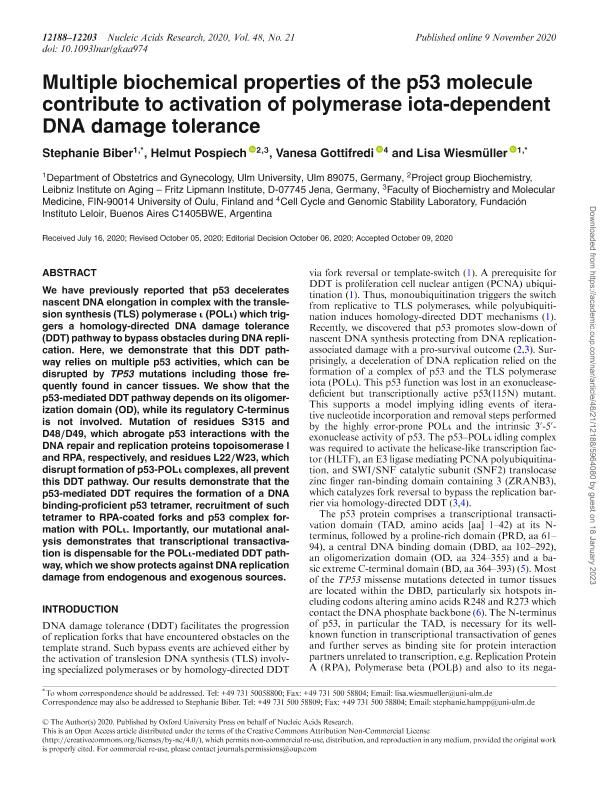Mostrar el registro sencillo del ítem
dc.contributor.author
Biber, Stephanie
dc.contributor.author
Pospiech, Helmut
dc.contributor.author
Gottifredi, Vanesa

dc.contributor.author
Wiesmüller, Lisa
dc.date.available
2023-01-18T20:13:25Z
dc.date.issued
2020-11
dc.identifier.citation
Biber, Stephanie; Pospiech, Helmut; Gottifredi, Vanesa; Wiesmüller, Lisa; Multiple biochemical properties of the p53 molecule contribute to activation of polymerase iota-dependent DNA damage tolerance; Oxford University Press; Nucleic Acids Research; 48; 21; 11-2020; 12188-12203
dc.identifier.issn
0305-1048
dc.identifier.uri
http://hdl.handle.net/11336/184944
dc.description.abstract
We have previously reported that p53 decelerates nascent DNA elongation in complex with the translesion synthesis (TLS) polymerase ι (POLι) which triggers a homology-directed DNA damage tolerance (DDT) pathway to bypass obstacles during DNA replication. Here, we demonstrate that this DDT pathway relies on multiple p53 activities, which can be disrupted by TP53 mutations including those frequently found in cancer tissues. We show that the p53-mediated DDT pathway depends on its oligomerization domain (OD), while its regulatory C-terminus is not involved. Mutation of residues S315 and D48/D49, which abrogate p53 interactions with the DNA repair and replication proteins topoisomerase I and RPA, respectively, and residues L22/W23, which disrupt formation of p53-POLι complexes, all prevent this DDT pathway. Our results demonstrate that the p53-mediated DDT requires the formation of a DNA binding-proficient p53 tetramer, recruitment of such tetramer to RPA-coated forks and p53 complex formation with POLι. Importantly, our mutational analysis demonstrates that transcriptional transactivation is dispensable for the POLι-mediated DDT pathway, which we show protects against DNA replication damage from endogenous and exogenous sources.
dc.format
application/pdf
dc.language.iso
eng
dc.publisher
Oxford University Press

dc.rights
info:eu-repo/semantics/openAccess
dc.rights.uri
https://creativecommons.org/licenses/by-nc/2.5/ar/
dc.subject
P53
dc.subject
POL IOTA
dc.subject
TRASCRIPTIONAL TARGETS
dc.subject
RPA
dc.subject.classification
Biología Celular, Microbiología

dc.subject.classification
Ciencias Biológicas

dc.subject.classification
CIENCIAS NATURALES Y EXACTAS

dc.title
Multiple biochemical properties of the p53 molecule contribute to activation of polymerase iota-dependent DNA damage tolerance
dc.type
info:eu-repo/semantics/article
dc.type
info:ar-repo/semantics/artículo
dc.type
info:eu-repo/semantics/publishedVersion
dc.date.updated
2022-11-09T19:31:47Z
dc.identifier.eissn
1362-4962
dc.journal.volume
48
dc.journal.number
21
dc.journal.pagination
12188-12203
dc.journal.pais
Reino Unido

dc.journal.ciudad
Oxford
dc.description.fil
Fil: Biber, Stephanie. Universitat Ulm; Alemania
dc.description.fil
Fil: Pospiech, Helmut. Fritz Lipmann Institute; Alemania. University Of Oulu (oy);
dc.description.fil
Fil: Gottifredi, Vanesa. Consejo Nacional de Investigaciones Científicas y Técnicas. Oficina de Coordinación Administrativa Parque Centenario. Instituto de Investigaciones Bioquímicas de Buenos Aires. Fundación Instituto Leloir. Instituto de Investigaciones Bioquímicas de Buenos Aires; Argentina
dc.description.fil
Fil: Wiesmüller, Lisa. Universitat Ulm; Alemania
dc.journal.title
Nucleic Acids Research

dc.relation.alternativeid
info:eu-repo/semantics/altIdentifier/url/https://academic.oup.com/nar/article/48/21/12188/5964080
dc.relation.alternativeid
info:eu-repo/semantics/altIdentifier/doi/http://dx.doi.org/10.1093/nar/gkaa974
Archivos asociados
